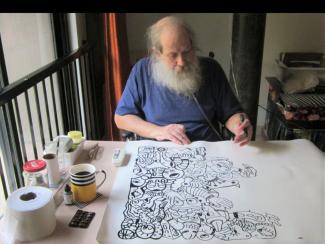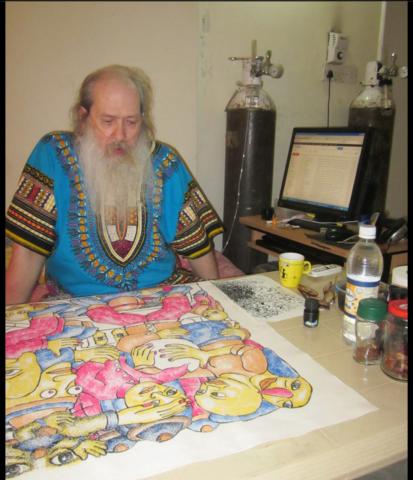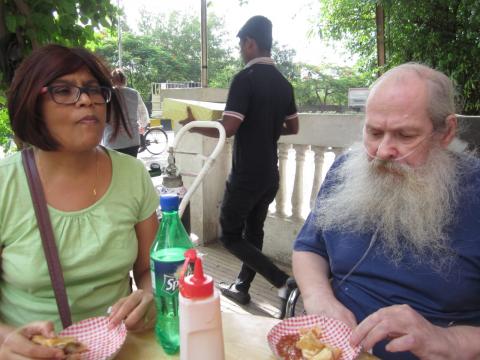
Filomina Pawar was a caregiver for 10 years to her Belgian artist partner, Eric Weets, who lived with severe Chronic Obstructive Pulmonary Disease. Here she narrates how till his death she helped him with oxygen cylinders, chicken soup and air purifier so he could create his art.
Please could you tell us a little about yourself?
I was born in 1968 in Ahmednagar, Maharashtra.
When I was almost 30, I was fortunate enough to get into the company of creative minds of artists, architects which consequently led me to get interested in arts and ultimately I began studying 20th Century Western art. Since then my life, mostly, is about art. I have created works in oil, acrylic and digital media. After studying and experimenting in different mediums I got interested in computer generated art. I am a contemporary artist and create colorful abstract 3D digital art images. I have held numerous group and solo exhibition of acrylic on canvas and digital art prints.
When and how did you meet your artist partner Eric Weets? Could you give his background?
I met Eric in 1997-98. We met through a common friend when Eric was looking for a tutor for his children.
He was a Belgian national, born in 1951. He was an artist, drawing since the age of 3. He grew up with his maternal grandparents. Eric has childhood asthma. He started smoking pretty early, in his teenage years. Later, the smell of oil paint and lin seed oils contributed to his breathlessness.
What made you decide to become a caregiver to Eric? Can you elaborate?
We were living together. I wanted to assist him in everyway possible to give him the peace of mind so he could concentrate on creating his art work. In 2007, I found that there were occasions when his lips would turn blue. On investigations, he was diagnosed with COPD (Chronic Obstructive Pulmonary Disease). He was put on supplemental oxygen therapy at home. Eric didn't want anybody else to look after him so it naturally became my decision to be his caregiver.
Could you give us details about your initial journey as a caregiver to Eric?
As Eric was already asthmatic when we met, I was aware of his condition and we were living, taking his condition into consideration. As the disease is a gradual worsening one, the complications kept adding. Initially, I did not want to take on the responsibility of managing oxygen cylinder, the oxygen flow etc on me as I am not a trained professional but gradually, we managed it at home and things went smoothly.
From posts on social media, it appears Eric developed severe COPD. Did he face any limitations in activities of daily living? Was his art and painting affected?
Yes, he did develop severe COPD. Eric was dependant on me for 90% of his daily activities. The only thing he could do was paint because then he would sit at one place and did not have to do much movement, except his hand. Painting gave him solace and he forgot about his day-to-day misery of the disease.
How did your responsibilities increase in providing physical, psychological and emotional support as his disease progressed?
Like I said, he was dependant on me for 90% of his daily physical activities as the disease progressed. Psychologically, his work, as in painting, took care of him. Emotionally, I tried to give him as much peace as he needed to live his life as he wished, under the circumstances.
It is difficult to empathize with the patient till you know about the disease? Did you read about COPD or learn much about through experience?
You see the person struggling with breath and you cannot ignore it. I was very much empathic towards Eric's disease.
It was both. I learned about COPD on the media, newsletters, internet and through experience as well.
How did you handle phases of exacerbation or flare up?
I would call Eric's doctor, who would visit and the medicines would take care of the exacerbations.
How did you make the house COPD-friendly? What ways did you devise to conserve energy, make it less strenuous for him, declutter his environment and make it dust free?
We got air purifier, dehumidifier, heater, for each season to keep the temperature as constant as possible. The doors and windows were always closed and there was air conditioner for the summer, which he needed anyways due to the Indian summers.

How did you ensure that he was breathing efficiently? Did you make changes in his diet or encouraged him to do some breathing exercises?
Every change of season and otherwise too, I would make big batches of chicken stock, simmering the chicken bones for 7-8 hours with mirepoix (a mixture of sautéed chopped vegetables) and aromatics and give him soups so that he wouldn't catch cold. He rarely did.
Caregiving can be extremely challenging. How did you manage your stress and anxiety? Were there days when you felt totally isolated?
I was at home full time so there was not much stress about outside work. I took up art and it worked as a therapy for me. I would get lost creating my digital works. No, I didn’t feel isolated somehow, we had each other and that was enough for me.

Eric passed on in August 2018. As a caregiver, how did you cope with your grief and loss?
I thought, I did my best for 10 years. Couldn't have done more than I did. I have no misgivings that I fell short somewhere. So I accepted my grief and loss as I had accepted Eric's disease.
In 2017, I did suffer a mental breakdown. They diagnosed it as excessive stress disorder and I suffered again with a similar episode after Eric's passing on, in 2019. On both the occasions I was admitted to the hospital. I am still on medication for it and have to visit the doctor every month.
What has been you foremost learning from being a long time caregiver to a person with COPD?
That there is a lot of manmade suffering in our world and that if we think and want, we can get rid of the manmade suffering and live a content and happy life.
Because of dealing with the daily pain and suffering in my life and to sort of run away from it, I came up with my idealistic conceptual art, titled - "Utopian musings of my mind, imagining the possibilities : yearning to be human", where I imagine each person to live a utopian life. How it can be done, what and where have we gone wrong in our evolutionary process and how can we set it right.







